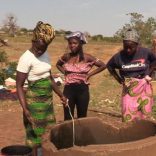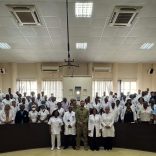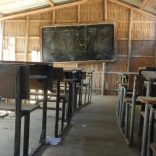European Union supports WFP disaster preparedness in Malawi, Madagascar, Mozambique, Zambia and ...
Op-Ed: Supporting women and girls is everyone’s business – By NneNne Iwuji

File photo: Courtesy of British High Commission Maputo
Every year on 8 March the world celebrates International Women’s Day. But this year we need to do much more than just celebrate women and girls: we need to break the biases. The past two years have demonstrated why this action is critical.
We’ve seen the devastating impact that COVID-19 has had on the livelihoods of women and access to education for both boys and girls. Disruption to health services has driven a surge in unintended pregnancies, unsafe abortions, and maternal and new-born deaths. And during lockdowns we saw a shocking rise in violence against women and girls in the world.
Yet, women make up half of the world’s population and half the global potential. COVID-19 has also seen dramatic increases in girls dropping out of school. The World Bank estimates that 2.6 million girls across Africa are at risk of not returning to school.
Educating girls, empowering women and ending violence against women and children is a moral imperative for us all, and one that will have a direct positive impact on the world’s economy, health and security – accelerating inclusive growth across Africa, including for countries like Mozambique.
A combined effort from businesses, communities, citizens and the international community is needed to tackle the discrimination, violence and inequality that hold women back.
If girls do not get 12 years of quality education, this doesn’t only affect their employment prospects – it also makes them more susceptible to early childhood marriage, domestic violence and violence in conflict. This is why the UK Government invested £430m in the Global Partnership for Education at the Global Education Summit in London last year, co-hosted with Kenya, in which the Mozambican Minister for Education HE Carmelita Namashulua participated virtually. The Summit raised an unprecedented $4 billion for the Global Partnership for Education.
Since 2010 sub-Saharan African economies are reported to have lost about $95 billion yearly because of the gender gap in the labour market. When there is investment in women as workers, leaders and entrepreneurs, everyone benefits from their economic independence.
Women’s empowerment also comes from sexual and reproductive health and rights and access to health services.
Women and girls are best placed to have control of their bodies; choosing if, whether and when to have children, so they can complete their education, build livelihoods and fulfil their potential. Here in Mozambique, the UK is supporting women and girls to access SRHR in health facilities and communities in Nampula and Zambezia province. We will also be piloting approaches to support adolescent girls and young women to prevent unintended pregnancies and early marriage by partnering with our social protection programme
As a leading global voice on Women, Peace and Security, the UK will continue to push for the full, equal and meaningful participation of women in all peace efforts, including as mediators and negotiators.
We’re also working with our partners to improve women’s economic empowerment – through schemes such as the MUVA programme in Mozambique, where the UK has used innovative approaches to increase economic opportunities for 6,000 young women as they move from education to employment.
We are also working closely with Mozambican female entrepreneurs and trailblazers, through our UK-Mozambique Female entrepreneurs working group, a proactive business networking platform that aims to ensure that Mozambican business women are part of the country’s emerging commercial opportunities from energy and agriculture, to finance fashion and technology, female representation and inclusion at all levels of the private sector, including boardrooms, is key.
The same commitment applies to climate change. As agreed at COP we are working with partners to integrate gender equality into national climate policies, plans, and strategies, and to increase women’s participation and leadership in all levels of climate action.
There’s great work going on. But sadly, despite all this, we all know that violence against women continues in different forms.
This year the UK will play a leading role in ending violence against women and girls, including hosting an international conference and building momentum towards a new global treaty to stop the use of rape and sexual violence in war.
I am personally committed to seeing transformation in the freedoms of women and girls, by working together with our partners in Mozambique to educate girls, empower women politically, socially and economically and to eradicate gender-based violence so women and girls can reach their full potential.
I invite you to think about what you can do to #breakthebias and champion gender equality for the benefit of everyone.
By NneNne Iwuji
- British High Commissioner to Mozambique













Leave a Reply
Be the First to Comment!
You must be logged in to post a comment.
You must be logged in to post a comment.